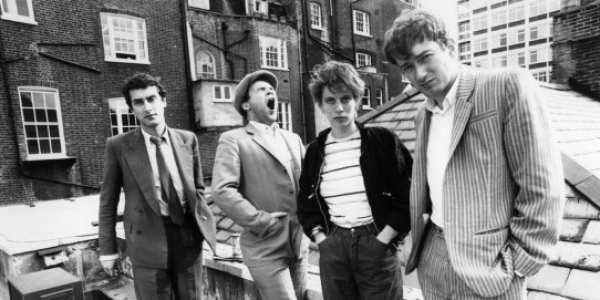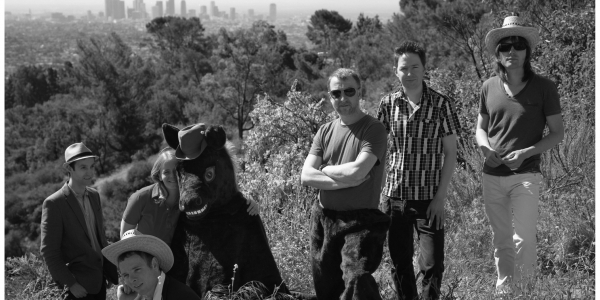If the Sex Pistols gleefully played the part of tabloid anti-establishment agitators in the UK punk scene, Gang Of Four filled the role of the intellectual punk rock band.
If the Sex Pistols gleefully played the part of tabloid anti-establishment agitators in the UK punk scene, Gang Of Four filled the role of the intellectual punk rock band. With a sound and style based on guitarist Andy Gill’s jarring, angular chords and Jon King’s left-wing rhetoric, Gang Of Four held a mirror up to the social and political discontent that permeated England in the mid-to-late 1970s. But for Gill, the band’s political edge was merely symptomatic of the time. "It’s a slightly complicated question, Gang Of Four and the political thing," muses Gill. "I don’t want people to get the wrong impression about the band and politics. Lyrically, we describe the emotional and physical situations, and events in the wider world. It just happened that those events had a political element."
Gang Of Four formed in 1976, with Dave Allen on bass and Hugh Burnham on drums and released their debut single Damaged Goods in late 1978. The single included what became arguably the Gang Of Four’s most well known composition, the dark treatise on love in a punk world, (Love Like) Anthrax. The band’s first album, Entertainment! is also now widely recognised as one of the defining post-punk records. Gill’s sparse, sharp guitar style offered a musical metaphor to the social and economic dramas of the day. "I loved the roughness of the guitar – it really got into my DNA," Gill explains.
His early influences included Jimi Hendrix and the Motown bands; in the mid 1970s, Gill fell under the musical spell of Wilco Johnson, guitarist with seminal English rhythm and blues band Dr Feelgood. "Wilco Johnson was a brilliant guitarist," Gill admits. "The way the Feelgoods went on stage was massively important to us."
Gill sees his guitar style as inseparable from the intense style of rhythm section led by Burnham and Allen. "Many things came together, guitar-wise, but in a way you can’t the guitar away from the bass and drums," he muses. "You couldn’t do what we were doing with the guitars without having what the bass and drums were doing.
"I loved the groove, the rhythm of the groove."
Gill’s memories of the flaccid music scene – Dr Feelgood aside – in the years leading up to the punk scene are common to those of his contemporaries. "When punk came along live music became fun again," he recalls.
While acknowledging Gang Of Four’s sharp-tongued political rhetorical, Gill prefers to see it as happenstance rather than part of a pre-conceived political manifesto. "We were never interested in banging the Marxist drum, or proselytising the left," he explains. "Music should be radical, but to adopt a particular ideological view is reactionary. And they way we think about things is quite fluid.
"We were making it up as we were going along. The closest thing to an agenda that we had was Entertainment! – that was our agenda," he affirms.
That all said, Gill concedes that politics was unavoidable in the United Kingdom in the late-1970s, with the country beset by industrial upheaval, racial tensions and distrust with the prevailing government paradigm that had evolved in the UK after the second world war. "Britain in the late 1970s was a radical place," Gill remembers. "The country was polarised, and it often seemed on the verge of civil war. It seemed that you were obliged to have a political point of view."
Coming from the industrial city of Leeds, at the time in the early throes of the economic forces that would, under Margaret Thatcher’s reign in the 1980s, see the decline of the city’s once proud industrial and manufacturing base, Gang Of Four had an especially acute perspective. "It was a very confrontational time," Gill recalls. "We were based in Leeds, which was a city in decline. There were a lot of things comings together at the same time. We were studying art at the time at the university, and there were some very interesting teachers at the University of Leeds who influenced our thinking."
After Allen left in 1981, Gang Of Four continued onwards, before entering into an extended hiatus in 1984, before Gill and King reunited in 1991 to record Mall (a further studio album, Shrinkwrapped, was released in 1995). In 2005 the original line-up of Gill, King, Allen and Burnham reformed, before Burnham and Allen left in 2006 and 2008 respectively.
In 2010 Gang Of Four released their first studio album in 15 years, Content. With the Gang Of Four ‘brand’ already developed, the band were able to negotiate with labels from a relatively mature position. Gill says the prospect of a major label deal was never on the cards. "The thing about major labels like EMI (with whom Gang Of Four had signed in the 1970s) is that it’s a business model that’s based on something that worked many years ago – they take money out of gigs, out of merchandise," he explains.
Gang Of Four decided to negotiate with various independent labels in different marketing regions. In the United States, Gang Of Four signed with notable independent label YepRoc!, while in Australia, Content will be released via Inertia. "There were conversations with EMI at the beginning, but they weren’t going to pay decent royalty rates, so there was never really any prospect that we’d sign with them," Gill reveals. He and King’s musical partnership has also endured the test of time. "I tend to write the music, and give the songs to Jon, and he works on the lyrics," Gill says happily.
Alongside contemporaries Magazine and The Wedding Present, Gang Of Four’s musical influence can be seen in modern bands such as Franz Ferdinand and Bloc Party. Gill concurs that the signs of Gang Of Four can be seen regularly in the contemporary pop charts. "I know when people say they’ve been listening to Gang Of Four that I can hear it in there," Gill says. "But it’s funny that people don’t seem to pick up on what we were doing lyrically, but they pick up on what we were doing rhythmically," he shrugs.
GANG OF FOUR play SOUNDWAVE at the Melbourne Showgrounds this Friday March 4 with Iron Maiden and heaps of others. It’s sold out. They also play The Corner Hotel this evening, Wednesday March 2 – it’s also sold out. Their new album Content is out now through Inertia.

